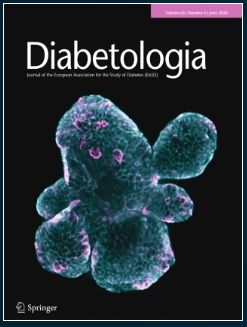Global challenges in diabetes research and care: which way forward? An appraisal from the EASD Global Council.
IF 10.2
1区 医学
Q1 ENDOCRINOLOGY & METABOLISM
引用次数: 0
Abstract
This review article, developed by the EASD Global Council, addresses the growing global challenges in diabetes research and care, highlighting the rising prevalence of diabetes, the increasing complexity of its management and the need for a coordinated international response. With regard to research, disparities in funding and infrastructure between high-income countries and low- and middle-income countries (LMICs) are discussed. The under-representation of LMIC populations in clinical trials, challenges in conducting large-scale research projects, and the ethical and legal complexities of artificial intelligence integration are also considered as specific issues. The development of global research networks and strategies for improved training, standardisation of data and enhanced accessibility to big data analytics to drive innovation and personalised medicine are recommended. With regard to diabetes care, inequalities in access to essential medications, particularly insulin and novel therapies, and disparities in healthcare infrastructure are discussed. Proposed initiatives include international support programmes, improved healthcare provider training and the inclusion of newer diabetes medications in essential drug lists. The importance of global screening programmes, a universal diabetes education curriculum and standardised healthcare checklists is also emphasised. Regarding healthcare organisation, the development of national diabetes registers, benchmarking performance across regions and strengthening international collaborations are highly advised. The role of diabetes specialists as care coordinators and the need for structured assessments to improve early intervention and long-term outcomes are also discussed. Ultimately, the EASD Global Council urges action for a unified, global approach to diabetes research and care to bridge the gap between scientific innovation and clinical practice, ensuring equitable healthcare worldwide.糖尿病研究和护理的全球挑战:前进的方向?EASD全球理事会的评估。
这篇综述文章由EASD全球理事会撰写,讨论了糖尿病研究和护理中日益增长的全球挑战,强调了糖尿病患病率的上升、糖尿病管理的日益复杂以及国际协调应对的必要性。在研究方面,讨论了高收入国家与低收入和中等收入国家(LMICs)在资金和基础设施方面的差距。临床试验中低收入人群的代表性不足,开展大规模研究项目的挑战,以及人工智能集成的伦理和法律复杂性也被认为是具体问题。建议发展全球研究网络和战略,以改进培训、数据标准化和增强对大数据分析的可及性,以推动创新和个性化医疗。在糖尿病护理方面,讨论了获得基本药物,特别是胰岛素和新疗法方面的不平等,以及医疗保健基础设施方面的差异。拟议的举措包括国际支助方案、改进保健提供者培训和将较新的糖尿病药物列入基本药物清单。报告还强调了全球筛查规划、普及糖尿病教育课程和标准化保健检查清单的重要性。关于医疗保健组织,国家糖尿病登记的发展,跨地区的基准绩效和加强国际合作是高度建议的。本文还讨论了糖尿病专家作为护理协调者的角色,以及为改善早期干预和长期结果而进行结构化评估的必要性。最后,EASD全球理事会敦促采取行动,对糖尿病研究和护理采取统一的全球方法,弥合科学创新和临床实践之间的差距,确保全球公平的医疗保健。
本文章由计算机程序翻译,如有差异,请以英文原文为准。
求助全文
约1分钟内获得全文
求助全文
来源期刊

Diabetologia
医学-内分泌学与代谢
CiteScore
18.10
自引率
2.40%
发文量
193
审稿时长
1 months
期刊介绍:
Diabetologia, the authoritative journal dedicated to diabetes research, holds high visibility through society membership, libraries, and social media. As the official journal of the European Association for the Study of Diabetes, it is ranked in the top quartile of the 2019 JCR Impact Factors in the Endocrinology & Metabolism category. The journal boasts dedicated and expert editorial teams committed to supporting authors throughout the peer review process.
 求助内容:
求助内容: 应助结果提醒方式:
应助结果提醒方式:


